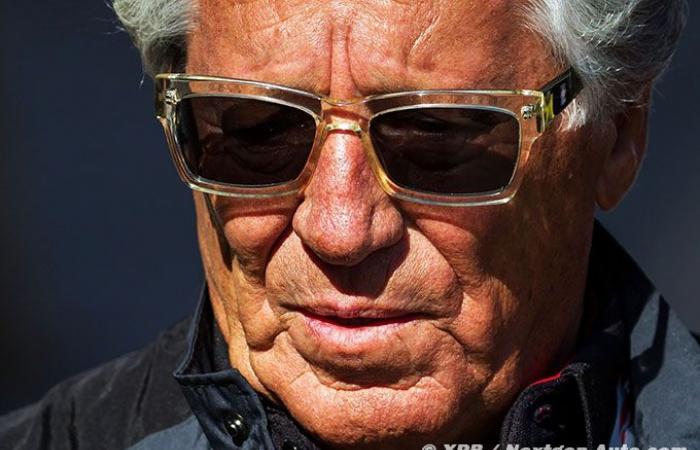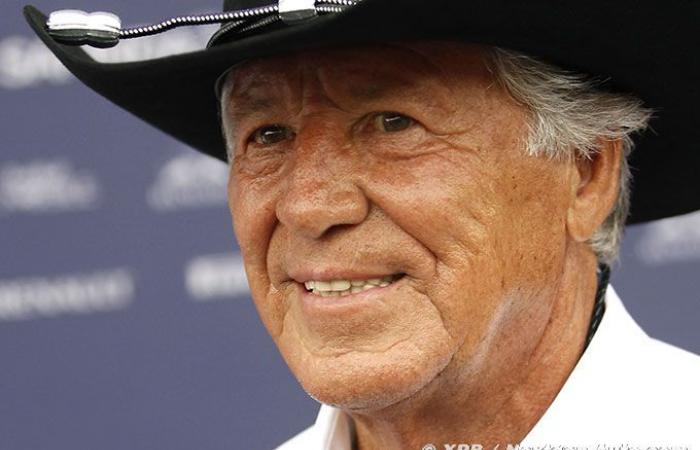Legend of American motorsport, Mario Andretti is also the last national of his country to have ever won a Grand Prix, in 1978, the year in which he was crowned world champion, with Lotus.
An American in F1: it wasn't that common. But how did Andretti, who was racing in IndyCar at the time, end up in F1? And particularly at Lotus?
The Italian by birth (in Istria) explained the origins of his involvement in F1: it all started with a meeting between Colin Chapman and himself in the American temple of motorsport…
“If I'm never depressed, I can just think back to that meeting – how important it was in my life, because it was my original dream to be a Formula 1 driver, let alone win a World Championship . In 1965, Jim Clark won at Indianapolis. I finished third, so obviously we had time to chat. As I said goodbye, I said to Colin Chapman: 'Colin, one day I'd like to go Formula 1.' And he said, 'Mario, when you feel ready, we'll have the third car for you.' »
“Then in 1967 we won the 12 Hours of Sebring. So in 1968 I called Colin and said, 'Colin, I'd like to do the last two races of the season in F1.' And he said, 'Okay, I'll get a car for you.' Then at Watkins Glen I didn't expect to be on pole and have Sir Jackie Stewart next to me. I was as surprised as everyone else. »
Mario Andretti actually took pole for his first GP, in the United States, at Watkins Glen, in a Lotus 49B… even though he had competed in a race in the USA 24 hours before!
After some sporadic involvement in F1 and a first full season with a satellite team, Parnelli, Mario Andretti signed up full-time with Lotus in 1977.
At Lotus, he established himself in particular as an excellent tunemaker – and it was a promise he made at the end of 1976 to Colin Chapman, the famous Lotus engineer and team director.
What was it like working with Colin Chapman and his difficult character?
“The best thing about him was that he kept my mind productive. Sometimes I wanted to slap him, but he made me think. We had this relationship because he knew the car, he knew so much about it, and he could almost see what I was saying. He and I never, ever, ever had a bad word. I don't know what it is, but we just bonded. I felt like I needed him, I really needed him so bad. »
3rd in the 1977 championship, Mario Andretti clearly gained momentum in 1978. At the wheel of a Lotus 79 which fully mastered ground effect (thanks also to the efforts of Andretti as tunemaker), the American would become champion of the world.
“At the start of 1978, I felt very confident in many ways. You always try to be realistic, but I felt like we definitely had a chance to win this championship. »
“My big strength this year… I knew the car very well. I think the car really spoke to me. I knew the key turns, the ones where we could gain the most time and lose a little elsewhere. When you're really in a comfort zone of the car, that's what makes the difference between pole position and second place. It's something you feel. We can't even explain it. »
At the time, on the F1 grid, was there a driver from whom Andretti was particularly inspired?
“The best thing is to watch the drivers when you are behind them. I was looking at some of Alan Jones' rope stitches. It wasn't really my style to take the rope point late, because of the ovals. I started to learn this. Someone who is in front of you, they are in front of you for a reason. There is always something you learn. I probably learned something until the very last race of my life. »
A tragic ending in 1978 with the death of Peterson
In 1978, Andretti's first rival was perhaps his Lotus teammate Ronnie Peterson. Peterson was unable to really defend his chances at the world championship, with a number 2 contract.
Did this strain the relationship between the two Lotus drivers? Andretti assures us no.
“We had a personal relationship off the track. We both had young families and our wives got along well. When he came to the United States, we would go to the lake and have so much fun, competing against each other, playing tennis. We had such a good relationship together things. He knew we weren't going to go into too much detail. We each had our own thing to do. 'If you surpass me,' I said, 'I will fight with you to the end.' I had enormous respect for him. »
At the 1978 Italian Grand Prix, the one where Andretti won the title, Peterson suffered a tragic accident and lost his life shortly after the Grand Prix. The party celebrating Andretti's title was of course canceled.
“It should have been the happiest day of my career, for sure. I couldn't celebrate my title. How could I celebrate? I had lost one of my best friends and I couldn't believe I had lost him, because I went into the accident and you could tell he was in shock, but he was alive . I thought he was going to have a problem with his leg and limp for a few months, but he was alive. »
“The next day, I was driving to the hospital, paying the toll, and a gentleman recognized me. He said, 'Have you heard? Turn on the radio. Ronnie Peterson just died.' I was like, 'Oh, my God, oh my God, oh, my God.' I just couldn't believe it. »
Did Andretti then think about stopping F1?
“Honestly, we never talked about it, even as a family. My wife simply understood me. I knew what she was thinking all the time, but it was never part of the conversation because it was there. The danger was there. »
“But if you’re going to dwell on that, then you just start doing something else.” You must not be there. It was my nature. I wanted this so bad. I couldn't see myself doing anything else with my professional life and being happy and satisfied. I was selfish, but I was willing to take the risk. Sometimes I feel guilty. Why was I spared? But do I take it for granted? No, I count my blessings every day, believe me. »







